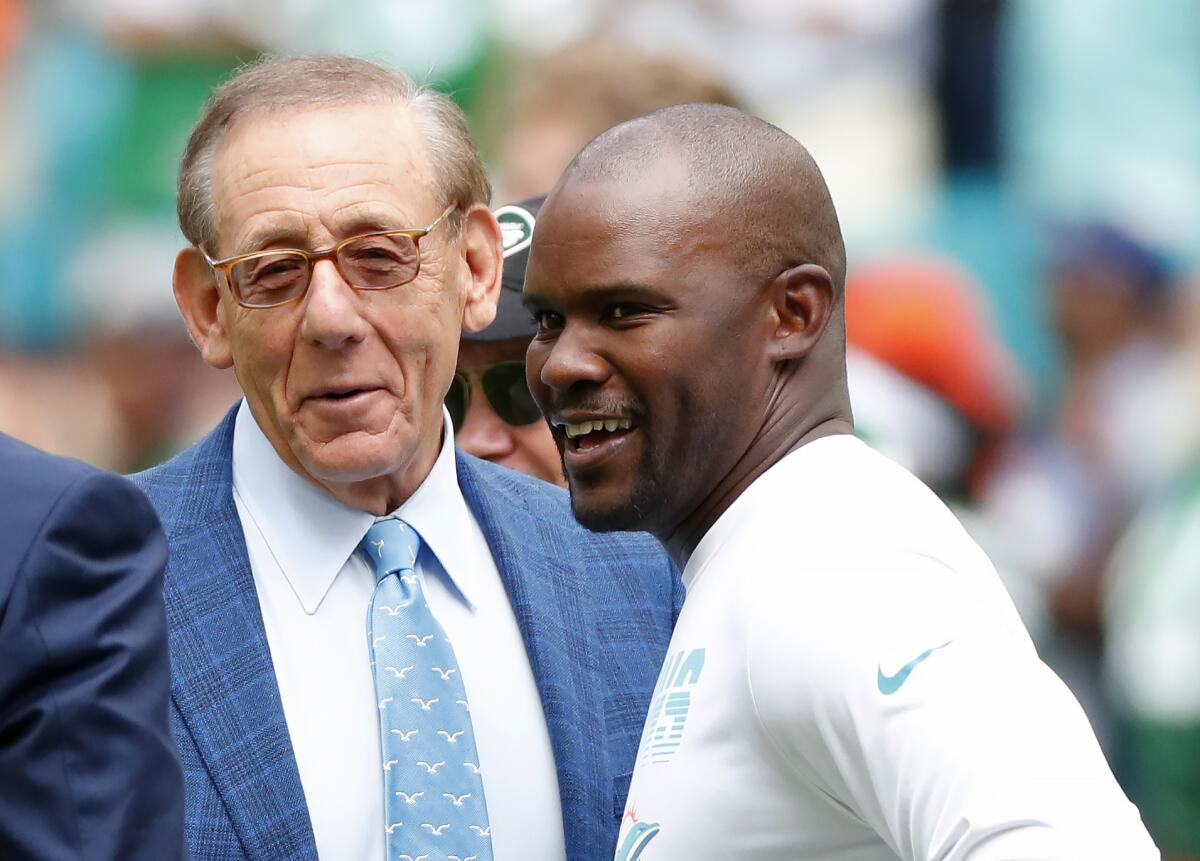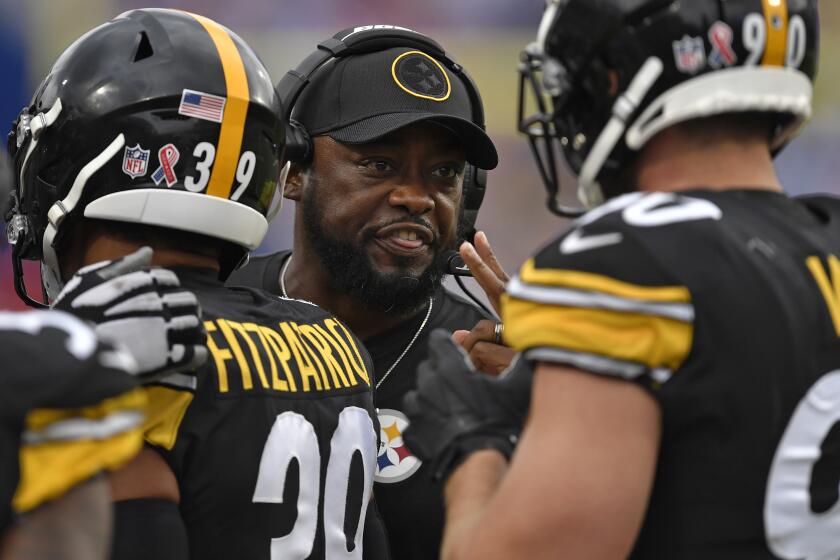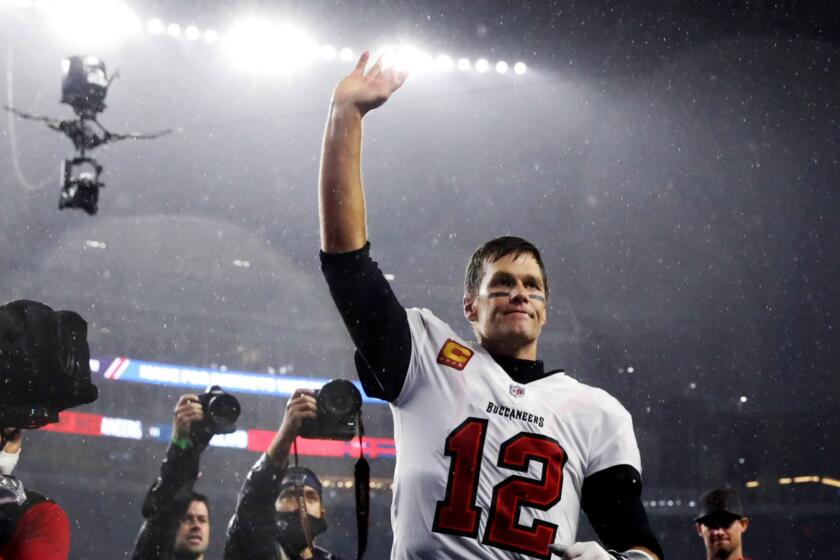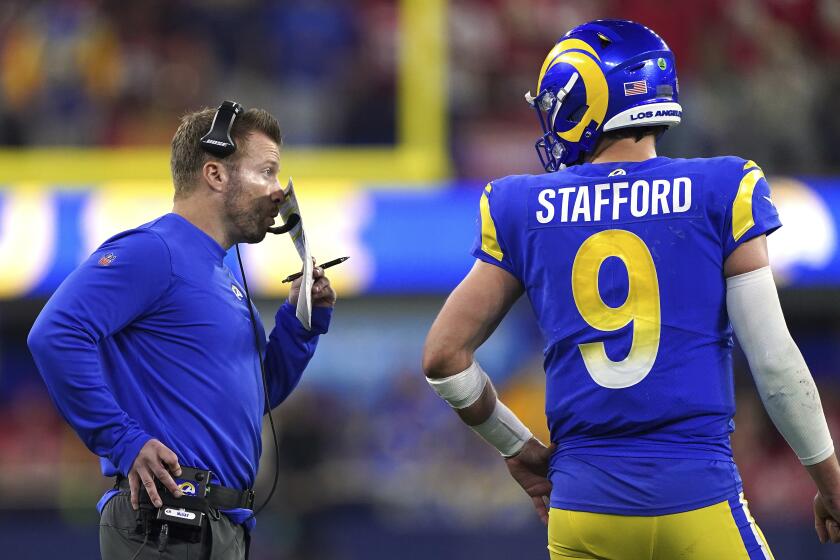Brian Flores sues NFL, three teams, alleging racism, offers of payment for tanking

Brian Flores, fired last month as coach of the Miami Dolphins, has filed a lawsuit alleging racial discrimination by NFL teams, and that his former team’s owner tried to get him to lose games for a favorable spot in the upcoming draft.
The lawsuit was filed Tuesday in Manhattan federal court and — using an accidental text from New England Patriots coach Bill Belichick as evidence — contends the New York Giants and 2019 Denver Broncos conducted sham interviews with Flores, who is Black, merely to satisfy diversity requirements.
“In making the decision to file the class action complaint today, I understand that I may be risking coaching the game that I love and that has done so much for my family and me,” said Flores, 40, in a written statement. “My sincere hope is that by standing up against systemic racism in the NFL, others will join me to ensure that positive change is made for generations to come.”
Flores was fired Jan. 10 despite leading the Dolphins to consecutive winning seasons for the first time since 2003. He alleges he fell out of favor with team owner Stephen Ross for rebuffing his attempts to intentionally lose games and to violate the league’s rules on tampering by recruiting a “prominent quarterback” under contract with another team.
The Dolphins finished third in the AFC East this season at 9-8 and missed the playoffs. In his three years, Flores had four different offensive coordinators, two defensive coordinators and four offensive line coaches. His teams went 24-25.
“I’ve been looking at this over three years now and watching the organization grow,” Ross said after the firing was announced. “And I think an organization can only function if it’s collaborative, and it works well together. And I don’t think that we were really working well as an organization that it would take to really win consistently at the NFL level.”
Look at the abysmal racial records of big corporations and the U.S. Senate.
The Dolphins released a statement Tuesday: “We are aware of the lawsuit through the media reports that are out this afternoon. We vehemently deny any allegations of racial discrimination and are proud of the diversity and inclusion throughout our organization. The implication that we acted in a manner inconsistent with the integrity of the game is incorrect. We will be withholding further comment on the lawsuit at this time.”
The lawsuit points out that although 70% of NFL players are Black, there currently is only one Black head coach (Pittsburgh’s Mike Tomlin), four Black offensive coordinators and six Black general managers. No principal owners are Black.
In the 2011 and ’17 seasons, the league had eight head coaches who were Black.
The NFL pushed back on Flores’ allegations of discrimination, saying: “The NFL and our clubs are deeply committed to ensuring equitable employment practices and continue to make progress in providing equitable opportunities throughout our organizations. Diversity is core to everything we do, and there are few issues on which our club and our internal leadership team spend more time.
“We will defend against these claims, which are without merit.”
The apparent flashpoint of the lawsuit came last month when Flores was to interview with the Giants for their head-coaching vacancy. Buffalo Bills offensive coordinator Brian Daboll, who ultimately got the job, had already interviewed with the Giants.
The NFL’s Rooney Rule stipulates that teams must interview minority candidates for open positions.
According to the lawsuit, just before he was to interview with the Giants, Flores received a text from Belichick congratulating him on getting the job, news the Patriots coach said he had heard from both the Bills and Giants. Apparently, Belichick thought he was texting with Daboll.
When Flores identified himself, Belichick wrote: “Sorry — I f----- this up. I double checked and misread the text. I think they are naming Brian Daboll. I’m sorry about that. BB.”
Tom Brady, who won six Super Bowls with the Patriots and one with the Buccaneers, announced his retirement on social media Tuesday.
In a statement, the Giants said: “We are pleased and confident with the process that resulted in the hiring of Brian Daboll. We interviewed an impressive and diverse group of candidates. The fact of the matter is, Brian Flores was in the conversation to be our head coach until the eleventh hour. Ultimately, we hired the individual we felt was most qualified to be our next head coach.”
Flores also points to an incident in 2019 when he was interviewing for Denver’s head-coaching job. He claimed that Broncos executive John Elway and others arrived at the meeting an hour late looking disheveled and “it was obvious they had been drinking heavily the night before.” The lawsuit contends it was obviously a sham interview by the Broncos, who wound up hiring Vic Fangio, who is white.
The Broncos have a different recollection of events, however, calling the Flores account “blatantly false.” The club contends the January 2019 meeting began promptly at the scheduled time of 7:30 a.m. at a hotel in Providence, R.I., that five team executives participated and interviewed Flores for the allotted 3½ hours.
“Pages of detailed notes, analysis and evaluations from our interview demonstrate the depth of our conversation and sincere interest in Mr. Flores as a head coaching candidate,” the team said in a written statement.
“Our process was thorough and fair to determine the most qualified candidate for our head coaching position. The Broncos will vigorously defend the integrity and values of our organization — and its employees — from such baseless and disparaging claims.”
The NFL has long grappled with the effective implementation of the Rooney Rule, and how to ensure teams embrace the spirit of it, rather than simply checking the boxes. In 2016, Hall of Fame coach Tony Dungy wrote a first-person story for the Los Angeles Times in which he discussed the pros and cons of the rule, named for late Pittsburgh Steelers owner Dan Rooney.
“To me, the goal wasn’t to get more minority coaches hired,” Dungy wrote. “It was to make people slow down and hire the right person for them. If that happens, then it’s successful.
“The spirit of the rule is really good. But what people have done more recently is, rather than figuring out what they’re looking for and drawing up some parameters and saying, ‘OK, let me look for some minority coaches who fit these parameters. Let’s discuss it and hire the right person,’ people are saying, ‘Let me just interview a minority candidate and then get down to the business of hiring who I feel like I should hire.’”
The Rams are known for making big-time acquisitions, but it was a series of less-newsworthy moves that helped them earn a spot in Super Bowl LVI.
The more surprising allegations in the Flores lawsuit are the ones leveled against the Dolphins owner. Flores claims that in 2019, his first season as coach, Ross offered to pay him $100,000 for every game the team lost in hopes of getting a favorable position in the draft. Fans widely accused the Dolphins of tanking, but there was no evidence to support that.
The Cincinnati Bengals finished 2-14 in 2019 and wound up with the No. 1 pick in 2020, with which they selected Louisiana State quarterback Joe Burrow, who this season led them to the Super Bowl.
The 5-11 Dolphins drafted fifth and took Alabama quarterback Tua Tagovailoa.
What’s more, Flores claims that Ross wanted him to recruit a player identified as a “prominent quarterback” who was playing for another team. Flores alleges that Ross invited him onto a yacht for lunch and informed him that player was “conveniently” arriving at the marina for an impromptu meeting.
“Mr. Flores refused the meeting and left the yacht immediately,” according to the lawsuit. “After the incident, Mr. Flores was treated with disdain and held out as someone who was noncompliant and difficult to work with.”
Wigdor Law LLP, which represents Flores, said the lawsuit aims to “level the playing field in the hope that future owners and coaches will be representative of the athletes who are playing this great game.”
Among the changes Flores wants: increased influence of Black individuals in the hiring and firing of GMs, coaches and coordinators; transparency of pay for NFL team executives and coaches; and unspecified damages from the league.
“God has gifted me with a special talent to coach the game of football,” he said in his statement, “but the need for change is bigger than my personal goals.”
More to Read
Go beyond the scoreboard
Get the latest on L.A.'s teams in the daily Sports Report newsletter.
You may occasionally receive promotional content from the Los Angeles Times.














